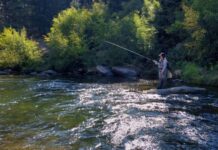The General Assembly has passed a bill that will make people pay for poaching striped bass.
Currently those who take more than one of the popular gamefish per day or land ones less than 28 inches or more than 35 inches, are charged with a misdemeanor that requires them to appear in court.
Under the new law, which will take effect as soon as Gov. Ned Lamont signs the bill, violators will be issued a ticket, which calls for fines beginning at $100 a fish for the first offense. The fines increase to $200 per fish for the second offense and a $500-per-fish fine and up to a 30-year prison term for future offenses.
Fisheries officials and supporters of the change say the current method of charging violators with a misdeameanor has made enforcement difficult. They say that’s because cases are often not prosecuted by court officials, but immediately issuing a violator a ticket, much as they would receive for speeding in a car, will better deter poaching and improve enforcement.
Phillip Sheffield of Mystic, the administrator for the popular Facebook group “Connecticut Catch and Release Fly Fishing,” said the bill was a positive step in protecting the region’s striped bass population. According to the Department of Energy and Environmental Protection, striped bass numbers have rebounded in recent years due to conservation efforts, but recent poaching is beginning to jeopardize that success.
Justin Davis, the assistant director of the DEEP’s Fisheries Division, who pushed for approval of the bill, explained that a striped bass shortage in the 1980s led to making poaching of the fish a misdemeanor rather than a simple infraction. But the change wound up backfiring.
“The practical end result was that our officers would pursue misdemeanor cases that would ultimately get thrown out,” Davis said. “You’d have a situation where a guy who took too many striped bass and got caught by our environmental conservation police. There’s a lot of paperwork for the officers, they would go through the whole process, and it would just get thrown out. Our ENCON (Environmental Conservation) police felt they didn’t have the tools they needed that they have in hand for enforcing all other marine fish violations. They said, ‘Why don’t we treat striped bass like we treat all other fish, and that will allow us to enforce the rules more effectively.”
Sheffield’s concerns about striped bass are well-founded among members of his Facebook group, who turned out in a letter-writing campaign supporting the bill.
“There’s a huge amount of striped bass poaching going on in Connecticut. The entire east coast is suffering from it,” he said. “There’s been a huge depletion of striped bass, and they’re in trouble. The marine fisheries managers are saying they’re overfished. The whole purpose of this bill primarily is so the enforcement officers can give these guys a fine instead of ending up in court with a judge who’s much more concerned with putting somebody in prison. It’s a much-needed bill and it was passed almost unanimously.”
Davis said overburdened courts no longer will have to decide whether to prosecute in a case regarding striped bass where someone took too many or the fish weren’t the right size.
“When looking at the violations in front of them they might look at someone who harvested a few too many fish or took a fish that was too small and not think it rises to the level of prosecution,” he said.
Fines will encourage violators not to go to court and deter them in the future, proponents say.
“It’s like when you get a speeding ticket, you might just say, ‘I’m going to pay the ticket, then it’s done with, and I don’t have to deal with the further hassle,” Davis said. “With an infraction you could still plead not guilty and go to court to try to get out of the fine, but people are less likely to do that, whereas with a misdemeanor case you’re compelling them to go to court.”
Davis said it’s not hyperbole to call striped bass “iconic,” certainly in the Northeast and along the entire Atlantic coast. He said they’re popular with recreational anglers, making them economically important.
“We rebuilt the striped bass stock,” he said. “We’re not back to where we were in the ’80s, it’s not that bad yet, but the stock is declining again, so people are now becoming attuned to that, and there’s a large public push for — we need to make sure we don’t let what happened in the 1980s happen again.”
In Connecticut, striped bass are seasonally found along the entire coastline and in all large tidal rivers during the summer and fall. The fish migrate south during winter, but some remain in the Thames River.
s.spinella@theday.com
Credit: Source link






























